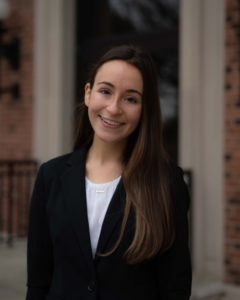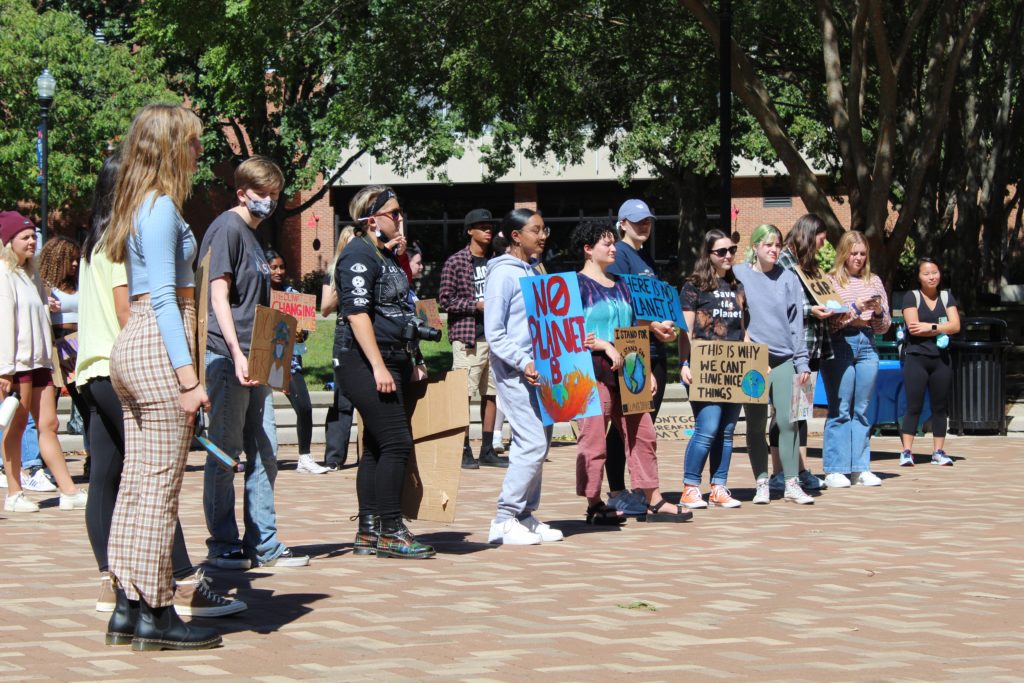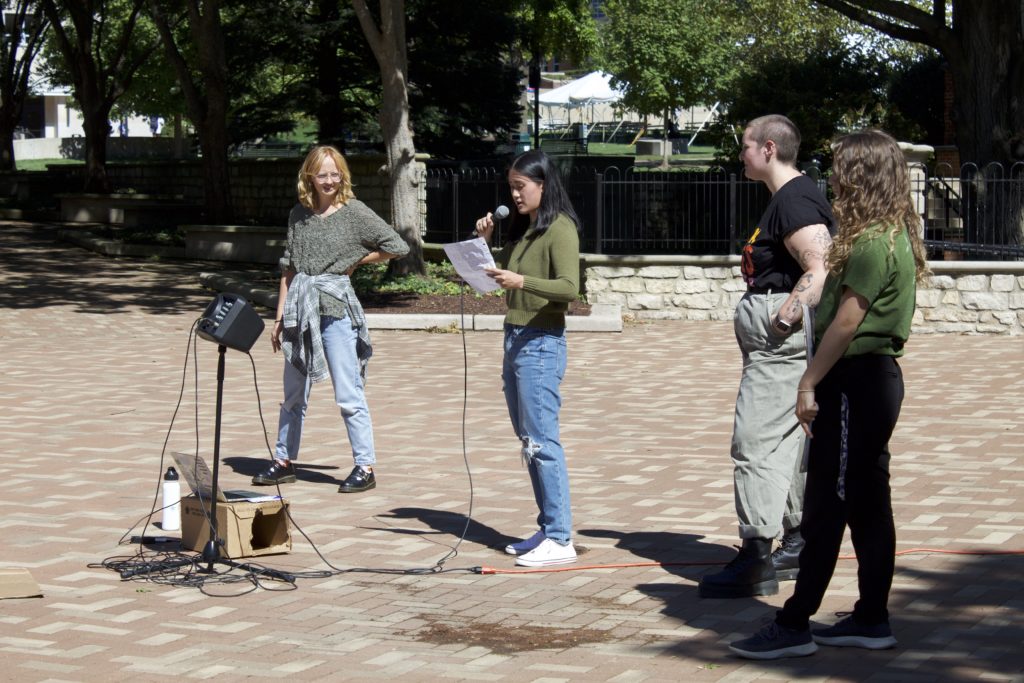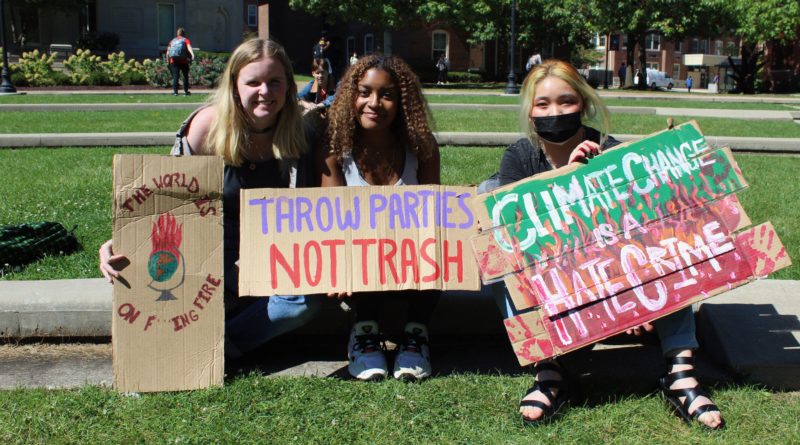UD students, staff participate in Global Climate Strike
Students joined over 150 countries walking out of work and school to participate in a global climate strike. Photo courtesy of Bartsche.

Maddy Bartsche | Arts & Entertainment Editor
On Friday, Sept. 24, students gathered together for the Global Climate Strike in the Humanities Plaza to advocate for environmental issues on campus.
The strike was planned and executed by the UD Sustainability Club Co-Presidents Caroline Garvey and Ellie Wasilewski, Elizabeth Gallagher, a representative from Spectrum, and UD Democrats member Lili Biswas. The event included speeches from the student organizers as well as Nick Cardilino, Abby Bruns, Bridget Graham, Amira Fitzpatrick and Vincent Miller.
The strike was part of the broader international climate movement, Fridays for the Future. Fridays for the Future is a youth-led-and-organized movement that began in August 2018, after 15-year-old Greta Thunberg and other young activists sat in front of the Swedish Parliament every school day for three weeks to protest against the lack of action on the climate crisis. Thunberg posted what she was doing on Twitter and it soon went viral.
Garvey said that within the US, there were a hundred different groups that set up strikes on Friday.
“The main overarching goal of these strikes is, I think, one for a kind of publicity,” Garvey said. “The more people who are aware of climate issues, the more I think people will be inclined to keep global leaders accountable for them. The other part is making sure that global leaders, politicians and people in charge of large companies are still seeing that people are going to hold them accountable for their actions in relation to how they are affecting and interpreting climate change.”

Students were encouraged to make their own signs at the event using recycled cardboard. Signs included phrases such as ‘There’s no Planet B,’ ‘Not the hot girl summer we meant,’ ‘We need to chill out’ and ‘La tierra te necesita: The earth needs you.’
In addition, students were encouraged to sign voter registration forms and to sign a letter to President Spina regarding issues such as access to Old River Park, recycling systems on campus, vegan/vegetarian options in dining halls, implementation of the anti-racism plan and UD’s effect on the greater Dayton community. Students can sign the letter here.
Gallagher said, “Having voter registration there was important to us because being active in elections, supporting candidates who prioritize the environment and holding your representative accountable after being elected is one of the best ways to make real, sustainable change.
“Overall, we hoped that this strike would encourage people on campus to be more sustainable and actively advocate for environmental issues as well as show university officials that this is an issue we as a student body care about. We want to see fundamental changes being made both on campus and within the Dayton community.”
Garvey said that students who want to bring urgency to the cause of climate change can do so by staying educated about the science behind climate change. Garvey also encourages students to contact their local and federal representatives about the issue.
Individuals can make an impact on the environment by buying local produce or cutting down on the amount of meat in their diet, which helps cut down on carbon and methane emissions, Garvey said.

In addition, Garvey added that it’s important to know that climate change disproportionately impacts those who suffer from socioeconomic inequalities, including people of color. In the United States, people of color are found to be particularly more vulnerable to heatwaves, extreme weather events, environmental degradation and subsequent labor market dislocations. Garvey said that if you find yourself in a place of privilege where you have the resources to make sustainable choices, do so with the realization that not everyone is able to make those choices.
Cardilino, staff director for Center for Social Concern, spoke at the strike about how sustainability and care for the planet correlate with UD’s Marianist values.
“One of the essential Marianist values is to work for justice and peace, which includes environmental sustainability,” Cardilino said. “Marianists also work at the intersection of sustainability and poverty and racism. The Mission of Mary and the Marianist Environmental Education Center are obvious examples of how Marianists live this out.”
Garvey also commented on the connection between faith and care for creation.
“I think the Marianist value of upholding the dignity of all its community members really ties well to the mission of sustainability, which is about making sure that everyone in a community is able to support themselves and thrive,” Garvey said.
Gallagher added that events like the climate strike are “vital, because we are running out of time.”
“There are only a couple of years left until the effects of climate change are irreversible,” Gallagher said. “We all need to come together and show global leaders that people will no longer stand by and accept substandard environmental policies and protections.”
For future climate-awareness events on campus, Garvey says to expect a possible Earth Day strike.
For more arts & entertainment news, like Flyer News on Facebook and follow us on Twitter (@FlyerNews) and Instagram (@flyernews).

